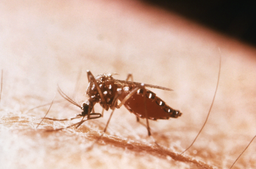Should I Be Worried About Chikungunya?
By Chris Williams on August 15, 2014.
 You may have seen news items about a new mosquito-vectored disease that has recently made its appearance in the U.S. It’s called chikungunya and is pronounced “chick-en-goon-yah.” Admittedly it sounds like a dish on the carryout menu of a Chinese restaurant.
You may have seen news items about a new mosquito-vectored disease that has recently made its appearance in the U.S. It’s called chikungunya and is pronounced “chick-en-goon-yah.” Admittedly it sounds like a dish on the carryout menu of a Chinese restaurant.
Actually, chikungunya is not a new disease, it’s been actively spreading in the Caribbean and in Central and South America. And there have even been earlier cases in this country, averaging 28 per year between 2006-2013. But they were all attributable to people who had traveled to the Caribbean, South America, the Pacific Islands, or Asia, and been bitten there. In other words, until recently, the cases had not been acquired from mosquitoes within the U.S.
In mid-July 2014, the first locally acquired human cases in the contintental U.S. were confirmed in Florida. This is a big deal because it indicates that, at least in that Florida region, enough people are infected (mostly from travel) to pass the disease from human to mosquito to human.
Chikungunya is spread by the bite of either the Asian tiger mosquito or the yellow fever mosquito. It is not spread directly from person to person and birds are not a part of its life cycle. It’s not as serious as some other mosquito-transmitted diseases, and usually causes headache, joint pain, rash, and fever lasting about a week.
Do We Even Have Chikungunya in the Northeast?
As of August 5, 2014, there have been a total of 484 chikungunya cases reported from U.S. states, and an additional 203 reported from Puerto Rico and the Virgin Islands were locally transmitted. But since it is not a nationally notifiable disease, the Centers for Disease Control expects that the total number of cases is much higher.
Technically, we do have chikungunya in Massachusetts and New Hampshire. Like the rest of the country, it appears here on occasion in someone who has traveled and been infected elsewhere. In July, New Hampshire reported two new cases of the disease in travelers, for a total of 4. Also in early July, the Boston Public Health Commission reported four new cases in Boston, bringing Massachusetts’s total to 22.
Could I Get Chikungunya?
Will the Northeast eventually have the same scenario as Florida, with mosquitoes transmitting chikungunya on a local level? Not likely. Before that could happen, one of the two mosquito vectors would have to establish in our region, or a mosquito currently here would have to become capable of transmitting the disease. As of now, the only known mosquito vectors of the disease do not occur in Massachusetts or New Hampshire (both are in Florida). However, it is expected that cases of chikungunya will continue to increase in the Northeast as the disease becomes more widespread in areas where people travel. You are at risk of getting it only if you travel to a region with an ongoing chikungunya outbreak.
Our local health officials want us to worry instead about the two mosquito-transmitted diseases that do occur here, West Nile Virus and Eastern Equine Encephalitis (see It’s Late Summer…Are Mosquitoes Still a Disease Threat?).
By CDC [Public domain], via Wikimedia Commons